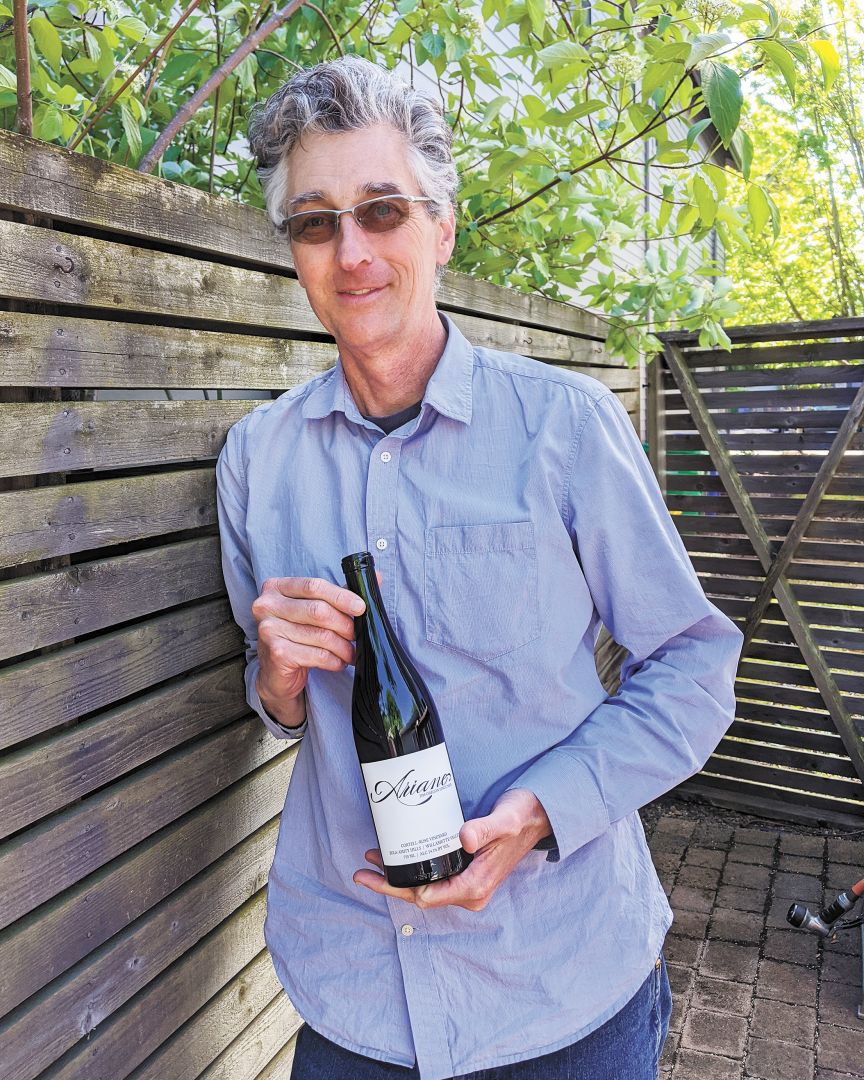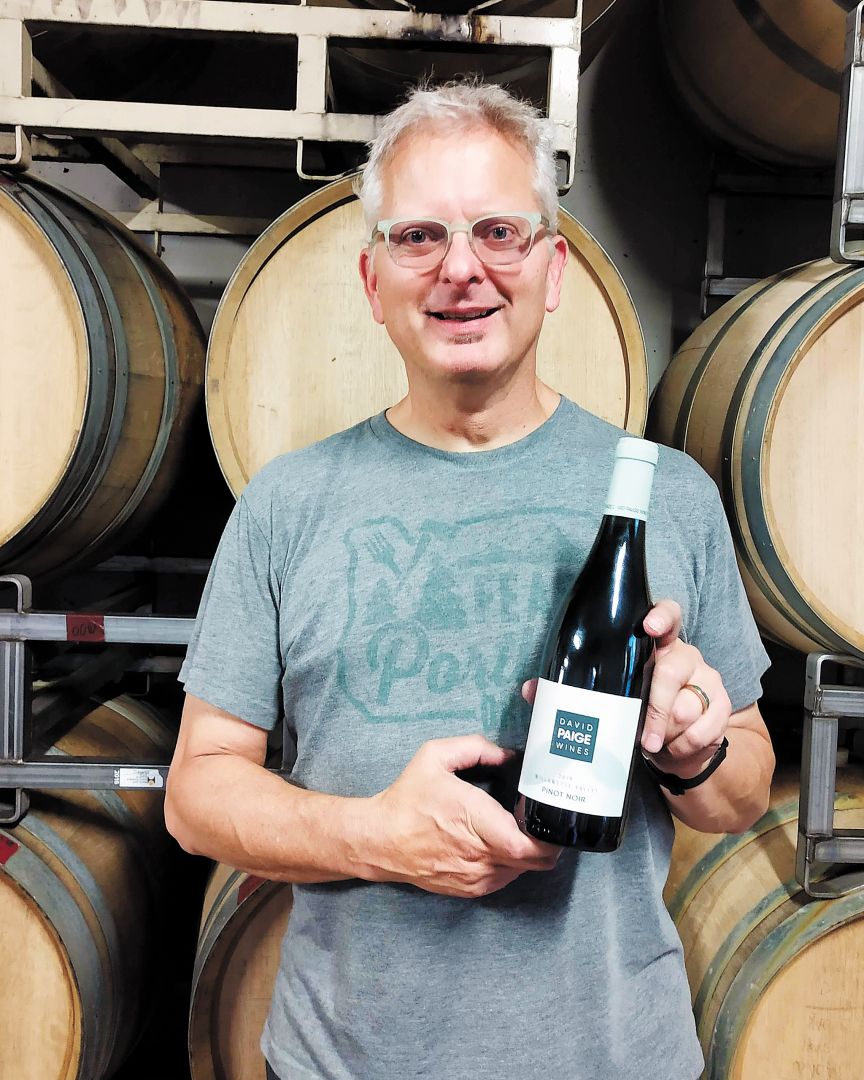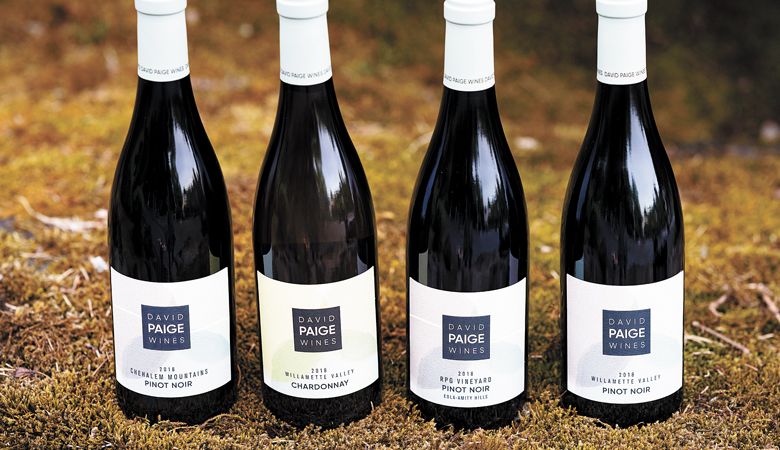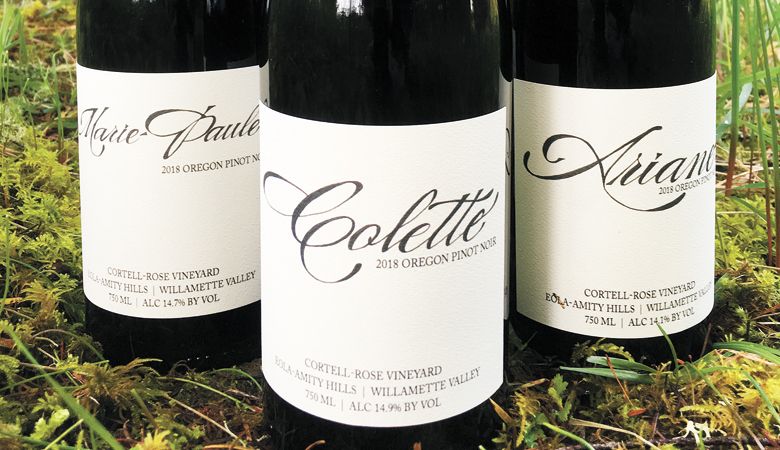Davids vs. Goliath
Two winemakers debut brands, coronavirus be damned!
In early 2020, David Patte of Sun Break Wine & Cider and David Paige of David Paige Wines were a couple of winemakers — no business or other relation to each other — in Oregon’s Eola-Amity Hills wine country in the southern Willamette Valley. Besides having coincidentally similar names, the two Davids were both planning to introduce brand-spanking-new wine brands this year.
Then March arrived, and with it a giant disease named COVID-19, wreaking havoc on their and everyone else’s best-laid plans.
The pandemic forced Patte to cancel a series of scheduled meetings with beverage distributors and restaurateurs locally and nationally.
“You put your business plan together and then you just kind of think about things that could go wrong,” Patte said. “And, sure enough, I release these three wines the first week of March in time for the wine walk in Corvallis, and then, BOOM, everything shuts down. I had meetings with distributors and wine club managers from the Northwest, Oregon, Illinois, Massachusetts and Tennessee — all canceled.”
Paige’s travel plans were also grounded indefinitely.
“I thought I’d be getting on planes and selling,” Paige said. “Suddenly I had to shift gears to maximizing sales online and posting to social media.”
In April 2020, according to a survey by the lobbying group WineAmerica, on-premise wine plummeted 80% on average. Restaurant sales disappeared overnight. Tasting rooms shuttered. Wine events scheduled for this year, such as Taste Washington, the International Pinot Noir Celebration and many others, were canceled, postponed until 2021 — fingers crossed.
In the weeks following the shelter-in-place mandate, off-premise sales for established wine brands skyrocketed, especially for those with grocery store distribution. Smaller brands have struggled, and others have succeeded at building off-premise, direct-to-consumer sales, which also rose significantly.
Growers like Paige, who co-owns a vineyard in addition to making wine, faced a different kind of uncertainty as winemakers pondered whether to commit to purchasing fruit for this year’s harvest.
“If you have an established wine brand or are a competitively priced retail brand, you might be doing well during COVID,” Paige said. “But even they are being cagey, because who knows how long their good fortune will last.”
The future for Oregon’s approximately 800 wineries appears uncertain. But Patte and Paige have another fact in common: optimism.
Through virtual tastings, invigorated outreach and delivery deals, both Davids are finding success slinging their distinctive, terroir-driven Oregon wines, and connecting with consumers in refreshing ways, despite the challenges caused by coronavirus.

Patte Hits the Jackpot
In a single casual throw out to the universe, David Patte scored a direct hit between the pandemic’s eyes.
A post of his on Wineberserkers went viral after catching the attention of Lettie Teague, who writes the most-read wine column in the world for The Wall Street Journal.
“[Lettie Teague] saw the post; she picked it up and called me for the interview, completely out of the blue,” Patte said.
The press coverage helped Patte to an exceptionally fast start for a first-time winemaker. Since the article appeared in April, Patte estimates about 60% of his sales resulted directly from the press coverage. By June, he was nearly sold out of one of his three newly released 2018 bottlings and had joined the NW Negociant Project, which will represent and distribute his wines and ciders in Oregon.
Patte’s streak of good luck has been accompanied by a lot of legwork and outreach. He has hosted numerous virtual wine tastings with consumers quarantined locally and afar. He’s also delivered wine directly to consumers in the Portland area and shipped wines around the nation.
“When this whole [shelter-in-place] thing started, a friend said, ‘Well, you’re going to have to do Zoom wine tastings, and I just kind of laughed, ‘Who’s going to want to do a Zoom wine tasting?’” Patte said. “And now, I do two or three a week.”
Sheltering in place has made it possible for Patte to connect and converse about wine with his customers, specifically the different winemaking techniques he’s applying.
“Have you wondered about the difference between wines from whole-cluster fermentations vs. destemmed?” Patte wrote in his post on Wine Berserkers. “Here’s an opportunity to try out the full spectrum of winemaking styles and test your assumptions. Will you enjoy all three, or have a strong preference for one style?”
Patte’s intriguing proposition attracted a few enthusiastic responses, and then took off after being mentioned in The Wall Street Journal. Adding to its appeal, Patte offered his wines at an introductory price of $29, plus a “StayHome” discount of 20% and free shipping with a three-bottle purchase.
His approach has been working. Patte has been able to connect with new clients, friends and colleagues in a much deeper way than he ever expected.
“Folks are antsy at home, so they love the ability to think and talk about something different for a little while,” he said.
Another positive aspect Patte didn’t foresee was the ease with which he has been able to connect with customers for direct sales and deliveries in the Portland area.
“In the past, it would have been very difficult to coordinate deliveries during the week, and then everyone is busy on weekends,” he said. “But we’re all captive now, so Thursdays have become delivery day and everyone’s home.”
Patte pursued winemaking following 25 years of service for the U.S. Fish and Wildlife Service. After early retirement in 2014, he and his wife sold their home in Portland with plans of buying a vineyard, but instead purchased a property in the Soap Creek Valley north of Corvallis that came with a few mature apple trees, kick-starting his cider operation and quickly expanding into wine.
Patte took winemaking classes at Chemeketa Community College. He interned at Anderson Family Vineyard in the Dundee Hills and with Patrick Reuter and Ryan Kelly-Burnett of Dominio IV. He apprenticed at his nephew’s winery, Mylan Wines, in Hood River, and was mentored by Thomas and Marlene Woodward, owners of Oak Ridge Vineyard in the Columbia Gorge. He has also worked with Dai Crisp and the rest of the Lumos Wine Company team. In 2017, Patte met Mark Rose, co-owner with Jessica Cortell of the Cortell-Rose Vineyard, from which he sources his grapes.
Buoyed by his early success, Patte is feeling optimistic about his pre-pandemic decision to double case production for 2019 and beyond.
“My long-term plan is to continue scaling up and exploring the potential of this one vineyard,” Patte said. “It’s a once-in-a-lifetime opportunity.”

Turning a New Paige
After 30 years in the winemaking business, David Paige is doing what he’s never done before.
“What’s new for me right now, coinciding with the COVID crisis, is that I’m actually completely debuting an entire lineup. In my entire career, I’ve never done that, gone from 0 to 60… Well, actually, with COVID, maybe 0 to 20,” Paige said.
“Still, it’s special to have people taste the first of these wines.”
David Paige Wines has been 30 years in the making. A winemaker since the ’80s, Paige graduated from UC Davis in 1989, then spent the ’90s at Cloninger Cellars and Jekel Vineyards in California. He moved to Oregon in 2001 and joined Adelsheim Vineyard, where he worked until 2018 alongside Oregon wine pioneer David Adelsheim.
Embarking on his new venture, Paige purchased an established vineyard with two investors, George Rickus and John Gorup (hence the acronym “RPG Vineyard”). The site, formerly known as Z’IVO Vineyard and owned by John and Kathy Zelko — now retired from the wine business — was planted in 1996.
“It’s a great site on a rolling volcanic slope. I’m very proud of it,” Paige said. “But it’s 25 acres, and we don’t make enough wine yet to use all of the fruit grown there, so we sell it.”
Selling grapes proves challenging in these uncertain economic times.
“People are being cagey. The initial effect COVID had was the impact on sales. The secondary is when people try to guess where things are leading,” Paige said.
But if there’s one thing Paige has learned since coronavirus reared its head, it’s the importance of maintaining one’s perspective.
“The wine industry is the long game,” Paige said. “It has such a long cycle. If I’m making wine, or taking a step further back, growing fruit to make wine out of this fall, I’m already looking ahead to 2022. In some ways, that’s less daunting than looking at what this July’s economy is going to look like. If you’re looking ahead, you can be reasonably optimistic that we’re going to get through this crisis.”
Like Patte, Paige has found success selling his wines and delivering them directly to customers in Portland and surrounding areas.
“It’s fun and symbolic of how connected I am to what’s in the bottle,” he said.
Besides his estate bottling, Paige makes Pinot Noir and Chardonnay from some of his favorite sites around the Willamette Valley, and a Pinot Noir from the Chehalem Mountains, the area he specialized in while at Adelsheim. For 2019, he’s planning to add a fifth bottle to his lineup, a Pinot Blanc.
“Things certainly haven’t slowed down, more so shifted gears. I’m thinking more about what I can say about the wines on Instagram, LinkedIn and writing content for our website,” he said.
Paige feels fortunate to be where he is. Sure, he’d rather travel around the country selling his wines. But spending time in the vineyard instead has reminded him there are larger cycles of growing and producing that run our lives.
“Part of me still feels in a hurry to be more established, to be at a more self-sustaining level, production- and sales-wise, but honestly, we have a superpower in that we are so small and so young. We haven’t built a winery yet; we don’t have a tasting room that’s staffed; we haven’t had to lay anybody off,” Paige said.
“It’s a good time to be small.”
Tasting Notes
David Patte makes three unique wines, yet all feature Pinot Noir grapes sourced from the Cortell-Rose Vineyard in Oregon’s Eola-Amity Hills AVA. Each was named after one of his French aunts; each features a different vinification method.
Sun Break 2018 Ariane Pinot Noir, Eola-Amity Hills
“Quite the beauty, tall and redhead, she would sunbathe topless, as is the fashion on the Riviera,” Patte noted about the aunt he named this wine after. Featuring 100% whole-cluster fermentation, this wine is quite wholesome, with aromas of ripe strawberries, nutmeg and woodland wildflowers. Slightly savory and medium-bodied with a scintillating streak of acidity from first sip to finish. Soft tannins, like toasted hazelnut skins. $29; 67 cases
Sun Break 2018 Colette Pinot Noir, Eola-Amity Hills
Named for his “bookish” aunt, this wine, made from 100% destemmed fruit, is on the wild side. Clocking in at 14.9% alcohol, the wine unleashes a potpourri of earthy, herbal, spicy scents: freshly grated nutmeg, tobacco, leather, potting soil and hibiscus. Piquant red currant and pomegranate resonate on a spicy, vivacious finish. $29; 76 cases
Sun Break 2018 Marie-Paule Pinot Noir, Eola-Amity Hills
This wine splits the difference: 50% destemmed/50% whole cluster. The result is ripe black cherry, very typical of the Eola-Amity Hills, balanced by a spicy, black tea finish. “She is beautiful and elegant, always in designer clothes and high heels, with perfume — even while house cleaning,” Patte remarked of the aunt who lends her name to this easy-drinking wine. $29; 156 cases
For the inaugural release of his eponymous wine label, David Paige offered four wines, each showcasing Paige’s masterful hand at crafting classic versions of Oregon’s signature cool-climate varieties, Pinot Noir and Chardonnay.
David Paige 2018 Chardonnay, Willamette Valley
A blend of the RPG Vineyard and Bill Blanchard’s tiny vineyard high in the Chehalem Mountains, this corn silk-colored wine balances minerality with bright fruit characteristics: mango, pineapple, pear, lemon and kiwi. $30; 200 cases
David Paige 2018 Pinot Noir, Willamette Valley
Balanced ripeness and richness, a mélange of Marionberries with resonant undertones of soil and spice. “The wine that’s described by your biggest circle should be the most balanced,” Paige said. $42; 500 cases
David Paige 2018 Pinot Noir, Chehalem Mountains
“The smaller the circle, the more personality,” Paige added. Predominantly from Wind Ridge Vineyard on Ribbon Ridge, with 8% Sufi Vineyard on the other side of the Chehalem Mountains. Ripe cherry, sandalwood and cocoa on the finish. $62; 160 cases
David Paige 2018 RPG Vineyard Pinot Noir, Eola-Amity Hills
Located on a volcanic ridge in the northeastern Eola-Amity Hills, the home vineyard produces a wine of intensity and texture. Ferric, peppery, apple skin. $80; 50 cases.












